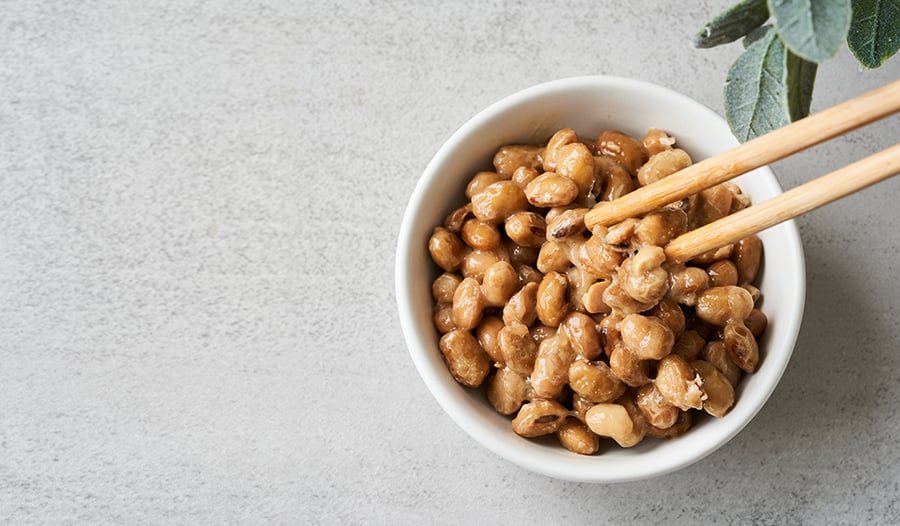Nattokinase: Előnyök és kiegészítők

Mi az a nattokináz?
A nattokináz egy enzim, amely a hagyományos japán ételekben található nattóban. A Natto főtt szójababból készül, amelyet Bacillus subtilis var. natto néven ismert baktériummal erjesztettek.
A nattokináz egészségügyi előnyei
A nattokináz, a natto által termeltenzim, számos egészségügyi előnnyel jár, és ideális azok számára, akik támogatni kívánják a szív- és érrendszeri egészséget, hígítani a vért és lebontani a vérrögöket. A nattokinázt általában natto fogyasztásával fogyasztják, de egyesek kiegészítő formában választják anattokináz-t, és gyógyszerként veszik.
Javítja a szív egészségét
A szív- és érrendszeri betegségek világszerte a vezető halálozási ok, évente körülbelül 17,9 millió életet vesznek el.[1]Szív- és érrendszeri betegségek közé tartozik a koszorúér-betegség, magas vérnyomás, szívmegállás, pangásos szívelégtelenség, aritmia, perifériás artériás betegség, stroke és veleszületett szívelégtelenség.
Bár a CVD gyakori, az egyszerű táplálkozási és életmódbeli szokások jelentősen befolyásolják az ember betegségének kialakulásának kockázatát. A CVD kockázatát növelő magatartások közé tartozik az egészségtelen étrend, az ülő életmód (fizikai inaktivitás), a dohányzás és az alkoholfogyasztás.
A nattokináz támogatja a szív egészségét azáltal, hogy segíti a vérrögök feloldását vagy megelőzését , csökkenti a vérnyomást, támogatja az egészséges koleszterinszintet és csökkenti a szívbetegségek általános kockázatát. [ 2] Általában a Nattokinase biztonságos és teljesen természetes kiegészítőnek tekinthető szív- és érrendszeri betegségek kezelésére. [ 3]
Csökkenti a stroke kockázatát
A stroke-ot az agy blokkolt véráramlása okozza, aminek következtében az agyszövet nem kap elegendő oxigént és tápanyagot. Kétféle stroke létezik: ischaemiás stroke és vérzéses stroke. Ischaemiás stroke akkor fordul elő, amikor az agy artériája eltömődik. A vérzéses stroke magában foglalja az agy véredényének szivárgását vagy felszakadását. Az ilyen típusú stroke mellett átmeneti ischaemiás roham (TIA) is előfordulhat, ha az agy véráramlásának átmeneti megzavarása következik be.
Bizonyos egészségügyi állapotok növelhetik a stroke kockázatát, beleértve a magas vérnyomást, a cukorbetegséget, a pitvarfibrillációt és a magas koleszterinszintet. A stroke családi anamnézisében vagy bizonyos életmódbeli tényezők szintén növelhetik a stroke kockázatát, beleértve a dohányfogyasztást, a túlzott alkoholfogyasztást, a túlsúlyt, az egészségtelen étrendet és az ülő életmódot.
Mivel a nattokináz elősegítheti a vérrögök feloldását vagy megelőzését, valamint csökkenti a koleszterinszintet, egészséges táplálkozással és testmozgással kombinálva csökkentheti a stroke kockázatát. A Nattokinasegyulladáscsökkentőés neuroprotektív hatása szintén elősegítheti a stroke-ból való gyógyulást, ha általános egészséges szokásokkal kombinálják, beleértve a táplálkozást és a fizikai mozgást.
Javítja a bél egészségét és fokozza az anyagcserét
Erjesztett ételként a natto probiotikumokban gazdag.Az erjesztett élelmiszerek számos egészségügyi előnyt nyújtanak, beleértve az antioxidáns, antimikrobiális, gombaellenes, gyulladáscsökkentő, diabéteszes és ateroszklerotikus hatást. [ 4] Natto probiotikus tulajdonságai támogatják a bél mikrobiális egyensúlyát és sokféleségét, ami javíthatja az emésztőrendszert és az immunrendszert, csökkenti az anyagcserét. [ 5,6 ]
Javítja a sinus egészségét
A nattokináz segíthet akrónikus sinusitistüneteinek javításában az orrpolipok összehúzódásával és a nyálka elvékonyodásával, ezáltal javítva a légáramlást. A kutatások szerint a nattokináz lebonthatja a véralvadásban részt vevő fehérjét, és zsugoríthatja az orrpolipszövetet.[7] Segíthet az orrváladék és a köpet viszkozitásának javításában (a légzőrendszerből köhögő nyál és nyálka keveréke) krónikus orrpolipokkal (CRSWNP) és asztmás betegeknél.
Védi az agy egészségét
Állati és in vitro vizsgálatok azt sugallják, hogy a nattokináz potenciális terápia lehet az Alzheimer-kór és a Parkinson-kór kezelésére, mivel csökkentheti az agy gyulladását. [ 8] A nattokináz segíthet a fibrin lebontásában, egy oldhatatlan fehérje lebontásában, amely vérzésre válaszul segíti a vérrögöket és részt vehet az Alzheimer-kórban. A nattokináz segíthet a memória és a tanulás javításában is.
A nattokináz gyakori mellékhatásai Egészségügyi kockázatai
Klinikai vizsgálatokban nem számoltak be a nattokináz fogyasztásának mellékhatásairól. Azonban a következő potenciálisan súlyos mellékhatások jelentkezhetnek.
Allergiás reakciók
A szójára allergiás emberek számára a nattokináz fogyasztása allergiás reakciót okozhat, beleértve a légzési nehézséget, kiütést vagy viszketést.
Alvadékok áthelyezése
A nattokináz segíthet a vérrögök felbomlásában és feloldásában.[2]Ez növelheti annak kockázatát, hogy a vérrög a test másik helyén elakadjon. A tüdőbe beragadt vérrög légzési nehézségeket okozhat, míg az agyi erekben lévő vérrög stroke-ot okozhat.
Túl alacsony vérnyomás
A nattokináz segíthet csökkenteni a vérnyomást. Azok számára, akik vérnyomáscsökkentő gyógyszereket szednek, vagy természetesen alacsony vérnyomásuk van, ez szédülést vagy ájulást okozhat.
Túlzott vérzés és véraláfutás
A nattokináz hígíthatja a vért, ami elősegítheti a vérrögök felbomlását és feloldását, és növeli a súlyos vérzés vagy véraláfutás kockázatát sérülés esetén. A vérhígító gyógyszert szedő embereknek konzultálniuk kell orvosukkal a nattokináz szedése előtt, hogy elkerüljék a kábítószer-tápanyag negatív kölcsönhatást.
Hogyan kell fogyasztani a Nattokinázt
A nattokináz természetesen megtalálható a natto-ban, egy hagyományos japán erjesztett szójababból készült ételben. Önmagában is élvezhető, bár általában rizs vagy pirítós tetején fogyasztják, zöldséggel meghintve.
A Natto beépíthető az ember mindennapi rutinjába, ha ebéd- vagy vacsoraétbe kerül. Például a natto könnyen hozzáadható salátához, csomagoláshoz, rizs- és zöldségtálhoz, natto miso levesként, további levesreceptekként, vagy köretként fogyasztható ebédhez vagy vacsorához.
A nattokináz kiegészítőként is fogyasztható. A vizsgálatok során a nattokináz egészségügyi előnyeit napi 100-200 milligramm bevételével társították.[9]Azonban mindig konzultáljon orvosával, hogy meghatározza a nattokináz legjobb személyes orális adagját.
Azok a személyek, akik vérnyomáscsökkentő gyógyszereket, vérhígító gyógyszereket szednek, vagy szójaallergiában szenvednek, nem szedhetnek nattokinázt.
Hogyan készítsünk Natto-t
12 csészét készít
Összetevők:
- 4 csésze szójabab
- 12 csésze víz áztatáshoz
- 2 teáskanál szűrt víz
- 1 kanál Nattomoto por
Utasítások:
- Áztassa a szójababot egy éjszakán át, háromszor annyi víz felhasználásával, mint a szójabab. Ez lehetővé teszi a bab kibővülését és kövérzését.
- Engedje le és öblítse le az áztatott szójababot, majd főzze instant edényben, gyorsfőzőben vagy a tűzhelyen, amíg meg nem lágy. Fontos: Ettől a ponttól kezdve minden edényt és edényt sterilizálni kell, különben penész és baktériumok alakulhatnak ki.
- Engedje le a főtt szójababot, és adjon hozzá egy nagy, sekély (sterilizált) üveg, kerámia vagy rozsdamentes acél keverőedényhez vagy sütőedényhez.
- Keverjen össze egy kanál nattomoto port 2 teáskanál szűrt vízzel, majd öntse rá a szójababot és alaposan keverje össze.
- Fedjük le a tálat vagy az edényt sterilizált sajtkendővel, és rögzítjük főzőzsineggel.
- Állítsa a sütőt a lehető legalacsonyabb beállításra - ideális esetben 100 és 200 Fahrenheit fok között. Helyezze a natto-t a sütőbe 24 órára. Használhat joghurtkészítőt, élelmiszer-szárítót vagy fermentációs dobozt is.
- Vegye ki a sütőből, és hagyja lehűlni két órán át, majd fedje le és tegye egy éjszakára a hűtőszekrénybe.
- Tárolja a natto-t hűtőszekrényben legfeljebb 2 napig, vagy adagolja fagyasztóban biztonságos tartályokba, és fagyasztsa le.
Natto táplálkozási előnyei
A Natto egy tápláló étel, amely gazdag rostban, fehérjében, mangánban, vasban, rézben, K-vitaminban, magnéziumban, kalciumban, C-vitaminban, káliumban, cinkben, szelénben, B-vitaminokban és probiotikumokban.
Egy 100 grammos adag natto a következőket tartalmazza:[10]
- Kalória: 211
- Fehérje: 19 gramm
- Rost: 5,4 gramm
- Zsír: 11 gramm
- Szénhidrátok: 13 gramm
- C-vitamin: 13 milligramm
- Vas: 8,6 milligramm
- Kálium: 729 milligramm
- Kalcium: 217 milligramm
Elvitelre
A nattokináz egy teljesen természetes enzim, amely a hagyományos japán ételekben található nattóban. A nattokináz számos egészségügyi előnnyel járhat, beleértve a szív egészségének támogatását, a stroke kockázatának csökkentését, valamint a sinus, a bél és az agy egészségének javítását.
Mielőtt natto fogyasztana vagy nattokináz-kiegészítőt szedne, beszéljen orvosával és/vagy regisztrált dietetikusával, hogy megtudja, a nattokináz megfelelő-e az Ön számára. Még akkor is, ha a kiegészítők természetesek vagy gyógynövényesek, kölcsönhatásba léphetnek más gyógyszerekkel vagy kiegészítőkkel, amelyeket szed. Mindig konzultáljon egészségügyi szolgáltatójával, mielőtt új kiegészítőt beépítene a wellness rutinjába.
Referenciák:
- Szív- és érrendszeri betegségek. Egészségügyi Világszervezet. Hozzáférés: 2024. március 18.
- Chen H, McGowan EM, Ren N és mtsai.Nattokinase: Ígéretes alternatíva a szív- és érrendszeri betegségek megelőzésében és kezelésében. Biomark Insights. 2018; 13.
- Weng Y, Yao J, Sparks S, Wang KY.Nattokináz: Orális antitrombotikus szer a szív- és érrendszeri betegségek megelőzésére. Int J Mol Tudomány 2017; 18 (3).
- Şanlier N, Gökcen BB, Sezgin AC.Az erjesztett élelmiszerek egészségügyi előnyei. Crit Rev Food Sci Nutr. 2019; 59 (3): 506-527.
- Miketinas DC, Bray GA, Beyl RA, Ryan DH, Sacks FM, Champagne CM.A rostbevitel előrejelzi a fogyást és az étrend-betartást azoknál a felnőtteknél, akik kalóriatartalmú étrendet fogyasztanak: Az elvesztett kilók (a túlsúly megelőzése új étrendi stratégiákkal) tanulmány. J. Nutr. 2019; 149 (10): 1742-1748.
- Guazzelli Marques C, de Piano Ganen A, Zaccaro de Barros A, Thomatieli dos Santos RV, dos Santos Quaresma MVL.Súlycsökkentő probiotikus kiegészítő hatás túlsúlyos és elhízási alanyoknál: áttekintés. Clin Nutr. 2020; 39 (3): 694-704.
- Takabayashi T, Imoto Y, Sakashita M és mtsai.A nattokináz, a profibrinolitikus enzim hatékonyan zsugorítja az orrpolip szövetet és csökkenti a nyálka viszkozitását. Allergol Int. 2017; 66 (4): 594-602.
- Naik S, Katariya R, Shelke S és mtsai.A nattokináz megakadályozza a β-amiloid peptid (Aβ1-42) által kiváltott neuropszichiátriai szövődményeket, neurogyulladást és BDNF jelzési zavarokat egerekben. Eur J Pharmacol. 2023; 952.
- Weng Y, Yao J, Sparks S, Wang KY.Nattokináz: Orális antitrombotikus szer a szív- és érrendszeri betegségek megelőzésére. Int J Mol Sci. 2017 február 28; 18 (3) :523.
- Afzaal M, Saeed F, iszlám F és mtsai.Natto táplálkozási egészségügyi perspektívája: kritikus áttekintés. Biochem Res Inter. 2022; 2022.
FELELŐSSÉGKIZÁRÓ NYILATKOZAT:A jelen blognak nem célja diagnózis felállítása...

















































































 Tartalomjegyzék
Tartalomjegyzék
















